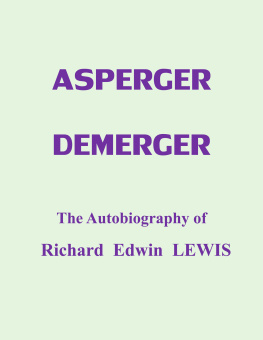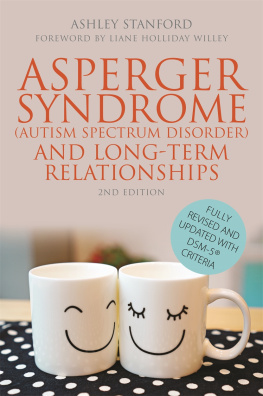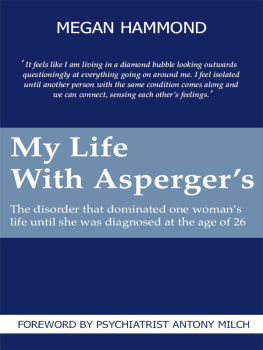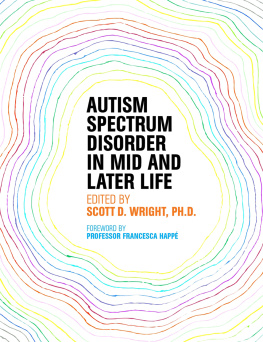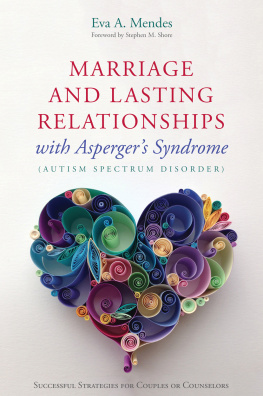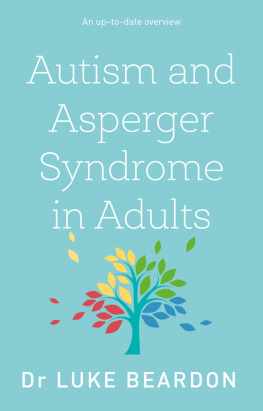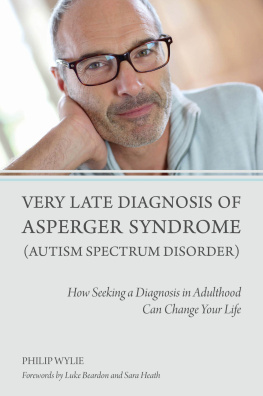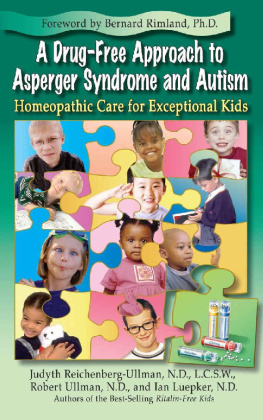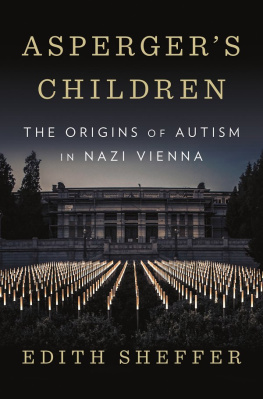ASPERGER DEMERGER
Autobiographical
by Richard Edwin LEWIS
2009 R. E. Lewis
Self published in Toowoomba Queensland Australia 2010
First printing in Toowoomba Queensland Australia 2010
Second printing in Gold Coast Queensland Australia 2011
e-Book launch Melbourne Australia 2011
ISBN 978-1-921999-16-1
The authors E-mail address is:
happyscratcher@hotmail.com
The book website is: www.aspergerdemerger.com
Chapter 1
Overview
For ten minutes I am at the right place with the right person. For ten years and more before I wasnt at the right place with the right person. Ten minutes is a tiny part of many years. I hear you have got Aspergers syndrome. What? Say that again. I had never heard of Aspergers syndrome but now I can tell you all about me and my Aspergers syndrome, and how ten minutes of fresh enlightenment led to making sense of all the years that preceded it.
To all youngies with diagnosed Aspergers syndrome, to all persons with late age diagnosis for Aspergers syndrome, and to all other interested others, welcome aboard!
I originally planned to use recurring acronyms in this work such as ROAD: r ecovery o f a lcohol d ependency; and A.S.: A spergers s yndrome; and N.T.: n eurological t ypical to name three of them. However I had second thoughts and have used common English wording as far as is possible e.g ROAD is now staying alcohol free. Thus this work can be picked up at any chapter without having to crack the code of multiple acronyms. Arent you glad? Some phrases are very repetitive but a necessary evil, like the ads on television. I love to use acronyms, but am aware that dear reader (thats you!) may not want too many of them, or it can be like trying to learn a new language as a force of my will.
After glancing at one of my defunct acronyms you may ask: what would it have to do with my Aspergers syndrome? Youll find out soon! It shall be explained what they are in detail and how they relate to me and my Aspergers syndrome.
Who am I? I am a nice and interesting person (in my humble opinion!) and Ill tell you more about me as we go along. Well, Id have to wouldnt I? This is an autobiography! I want you to make an assumption. This can be a dangerous practice so I ask you to take a risk. I want you to assume that I am worth knowing and what I say is worth hearing!
If you are a reader that is knowledgeable of writings of Aspergers syndrome you would quickly pick up on the expansion of the acronyms A.S. and N.T., but if not it could be a case of showing you both barrels abruptly. Showing you both barrels is a figurative expression which may mean handling an apparently serious situation with a decisive attitude. Picture a pesky fox looking at the chicken farmers shotgun. Thats the only time I will mention guns, I never found them stimulating. A figurative expression describes a thing in terms of another thing.
I treat the term non-autistic as being the same as non-autistic person, neurologically typical person, or neurotypical person.
This work tends to infer that there only two types of people in this world, the persons that have Aspergers syndrome and those that do not. This neat classification is an over simplification. I can see that two types, to the exclusion of all other types, does not comprehensively capture the human population of planet Earth. Especially that mention of the do nots (who are the non-autistic persons) because I have picked up that many people may have a trait which might be found in autism but not enough other clustered traits to make them a person with autism. And of course the manuals of psychiatry have other classifications.
I am mainly writing from two angles: firstly as the person-with-Asperger-syndrome that interacts with non-autistics; and secondly as also interacting with other persons-with-Asperger-syndrome. These simplifications provide a working base for this written work.
I shall now remove the apostrophe ess and shorten Aspergers syndrome to Asperger syndrome. This could be disliked by some but I do it to make a slightly more concise term through this writing. Health professionals, one of which I am not, can easily lick me in any debate on Aspergers syndrome versus Asperger syndrome. Obvious to me is that syndrome can have a negative connotation.
The person with Asperger syndrome may accept their diagnosis, adjust their behavior and function more happily. They may be regarded as having moved positively forward in life and out of a syndrome! A set of characteristics that made a syndrome could be a set of treated characteristics which are now relatively benign. Maybe from having a disability to having no disability.
Maybe one day in the future I could say that I no longer have Asperger syndrome, and that I have treated the useless effect of my hard wiring of Asperger syndrome and moved on from my syndrome by admission, acceptance and adjustment. I could give myself a self promotion and declare: I had Asperger syndrome and now I have had a successful treatment for Asperger syndrome. But I wont for now and Ill stay on as a person that still has his Asperger syndrome!
Re-raising the subject of acronyms again, I re-iterate that it could be convenient to have a short label to shrink the phrase a person-with-Asperger-syndrome. I actually brainstormed this phrase for a benign and lovable acronym and failed. I also brainstormed for a person-who-might-have-Asperger-syndrome and came up with only the one poor solution: casino = c andidate for A sperger- s yndrome diagnosis in the o ther person. It isnt benign or useful because an individual can have their own emotive perception of casinos proper and is it not wise for me to create a second meaning of casino in the lexicon because I could be treading on the toes of the rich and powerful.
Anyway, I really dont want an acronym in this context of the person-with-Asperger-syndrome because I have observed that a person-with-Asperger-syndrome has been referred to as an aspie or an autie. I see this is wrong because I believe it is an inaccurate label. To call a person-with-Asperger-syndrome an aspie or an autie suggests to me that that person is totally engulfed, mind and body with the syndrome. This is not quite true, I see myself as actually a human being with the Asperger syndrome not existing as my total essence of humanity. My Asperger syndrome does not define my person. It is not all of me. A label such as aspie can be given a derogative tone of voice by a bully. Labels belong on jam jars.
The phrases person-with-Asperger-syndrome and person-who-might-have-Asperger-syndrome have a heavy usage in this book, occurring over 100 times; they are hyphenated so your eyes can quickly recognize them. Below I will elaborate on the might have as I explain how I cant give a diagnosis for Asperger syndrome in others.
I call a non-autistic a non-autistic, which is a form of label, and I dont humanize it by saying a person who is a non-autistic, because a non-autistic is in the vast majority and commonly seen as normal. Non-autistics arent separated as being different.

